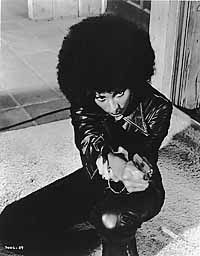https://www.austinchronicle.com/screens/1999-03-12/521558/
Players, Prisons, Pit Stops, and Girl Gangs
By Jerry Renshaw, March 12, 1999, Screens
|
|
Austin Chronicle: What early movie-watching experiences really stand out in your mind?
Jack Hill: The first movie I can really recall seeing was The Dawn Patrol with Errol Flynn; I was always partial to Warner Bros. since my father worked there from the silent days, before it was even Warner Bros., as a set designer and art director. Other than that, I used to go to the Hitching Post Theater on Hollywood Boulevard and watch cowboy movies as a kid.
AC: So you sort of grew up around movies?
JH: Yeah, my father, I can tell you, in The Dawn Patrol he pointed out that the planes we saw flying were not the same as the planes on the ground; he knew since he used to fly them in the First World War. Of course, the set design and art direction areas are sort of subcultures of their own. The only time I got to visit the studio was when my dad would take me there once in a while to see how the special effects were done, for instance on a picture called Action in the North Atlantic during WWII; they had these miniature ships and submarines with midgets driving them around in a big lake with a sky backdrop! So he would show me stuff like that once in a while.
AC: You and Francis Ford Coppola were classmates?
JH: Yeah, at the cinema department at UCLA in the early Sixties.
AC: How did you eventually progress into direction?
JH: After dropping out for awhile, I went back to UCLA to finish up on my degree in music; I was a professional musician and I wanted to score films, so I went into the cinema department. The courses led me into camerawork and writing and so on, and encouraged me to write, so I ended up directing a couple of student films. From there, I kind of gave up the music business and worked as a cameraman, sound recordist, editor, writer, and eventually wound up directing features. I just sort of fell into it, I didn't have ambitions of being a great director, filmmaker, I wasn't really a big movie buff particularly. So Francis and I went in separate directions, since he had come from a theatrical background in New York, he had written and directed his own plays, his father was a composer in the theatre, so when he came to UCLA he had the intentions of becoming the hottest director in town and had not a doubt in his mind that he would do just that. I, on the other hand, had no such ambitions and really didn't take it all very seriously; it just sort of happened.
AC: Well, that leads me to a useful segue point ... Roger Corman helped you get your feet on the ground, like he did for a lot of other people in the Sixties. Do you and Corman still see each other?
JH: Occasionally, we run into each other at functions.
AC: What sort of things did you take on under his tutelage?
JH: Oh, well, I did mostly odds and ends: editing; working on a Boris Karloff movie called The Terror, which I wound up splitting screen credit on after writing a considerable part of the script; doing repair work to fix movies that weren't finished and needed extra footage. Ultimately, the first complete feature I made for Roger was a picture about stock car racing called Pit Stop, which incidentally has gained a big cult following in the last couple of years.
AC: There are a lot of stories about The Terror. You directed a few days' worth of shooting, is that right?
JH: No, actually I didn't direct any of it, although I directed the dialogue replacement, the looping, with Jack Nicholson and the other cast members. On that one, Roger Corman directed three days' worth of shooting with Boris Karloff, then had Francis write additional material to flesh it out to a full-length movie. Francis directed those scenes, while I did sound and second camerawork. Unfortunately, a lot of what Francis had directed was supposed to be day-for-night, and he had neglected to tell the cameraman that, so a lot of that footage didn't work in the context of the film, which I must say didn't make a whole lot of sense anyway, and was edited out. Then Francis went to work on a project for a major company, so it fell on me to write yet another new script that made sense, which I did, to everyone's satisfaction. Monte Hellman directed those segments, and Roger shot one more day on a stage where he had a set left over from an AIP movie with someone doubling for Boris, and that's the way it all came together.
AC: Did Jack Nicholson direct a day too?
JH: Not to any recollection of mine. I've heard that story, but if he had I certainly would have known about it.
AC: It's remarkable that it turned out as coherent as it did!
JH: (laughs) Yeah, if you keep working on something long enough and keep fixing it! Oddly enough, it made Roger quite a bit of money eventually.
AC: So did you work on Coppola's Dementia 13 as well?
JH: Yes, I did quite a bit of work on that one actually, and wound up with a very odd screen credit; "Second Unit Written and Directed By ...". We needed a lot of extra scenes since the picture was too short, and I directed some and Francis directed some to fill it out.
AC: I love Lon Chaney Jr.'s performance in Spider Baby. How was he to work with?
JH: He was an absolute sweetheart.
Copyright © 2024 Austin Chronicle Corporation. All rights reserved.

